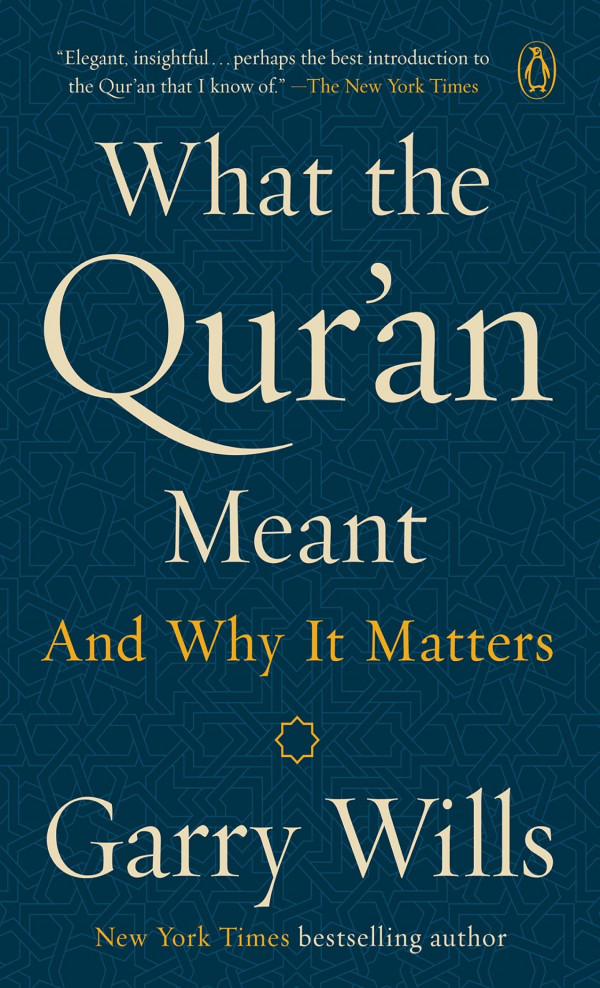
What the Qur'an Meant
And Why It Matters
- اطلاعات
- نقد و بررسی
- دیدگاه کاربران
نقد و بررسی

May 1, 2017
Does the Qur'an justify violence in the name of Islam? You can't really say if you don't know what it says. Wills, who has a stack of New York Times best sellers to his name, aims to provide understanding by taking a serious look at the text itself and comparing it with other sacred books to show why Muslims and non-Muslims alike have found it a source of inspiration.
Copyright 2017 Library Journal, LLC Used with permission.

August 14, 2017
Having translated the messages of the Christian Gospels and Paul’s epistles, Wills (Why Priests?) now attempts to explain the Qur’an in plain language. Wills situates his account within the context of the “global war on terror” and provides a generous reading of the Qur’an that resists oversimplification at each turn. However, it is somewhat audacious to say this is a book about “what the Qur’an meant” when the author admits he cannot read the Qur’an in Arabic and has little background in Islamic studies. Furthermore, Catholic Christianity, the Bible, and biblical interpretation loom large throughout the text. Thus, this is best viewed as a work of intimate and charitable interreligious dialogue in practice. Insights and explanations that will most benefit a general readership often come from sources that Wills has conveniently synthesized. Relying heavily on The Study Qur’an and several other secondary sources, the book bounces between what the Qur’an actually meant (and what specific Islamic sects believe) and what Wills thinks it means. Wills addresses issues that the Qur’an is concerned with (submission to Allah, the mercy and forgiveness of Allah, worship, civil relations, marriage), but he too often focuses on the topics that matter more to suspicious Westerners than to many everyday Muslims: war, women’s rights, and violence in general. Ironically, the book could exacerbate some of the decontextualized readings of the text that it seeks to contest.

September 1, 2017
Pulitzer Prize-winning author Wills (Emeritus, History/Northwestern Univ.; The Future of the Catholic Church with Pope Francis, 2015, etc.) defends the Quran in this layperson's review.Looking at the sacred text of Islam with unashamedly Western and inexpert eyes, the author finds that little of what most non-Muslims think about the book is true. In the first quarter of the book, Wills explains the impetus for studying the Quran: the West's many post-9/11 blunders in the Middle East. The author does not mince words, arguing that the conservatives in the George W. Bush administration rushed into a war with a people, culture, and religion they failed to understand. Given an age of ignorance and fear, writes Wills, "it is time for us to learn about the real Islam, beginning with its source book." The author goes on to explore various aspects of the Quran, often comparing it to the Old Testament and often pointing out popular misconceptions and quotes taken out of context in the West. While being clear that "the terrorists in modern Islam are not knowledgeable of their own religion in either profession or practice," Wills focuses not on Muslims who misread the text but on Westerners who misread it or, more to the point, never read it at all. He points out that in cases of less-than-kind passages, Christianity and Judaism have such lines of scripture of their own (such as prohibitions against apostasy). Wills goes further to note that harsh acts described by the Quran have been equaled or even surpassed in Christian history as well. Compare, he suggests, the Quranic rule about amputating a hand or foot with the realities of 16th-century tortures and executions of heretics in England. Wills has good reason to share his own reading and study of the Quran with a populace largely ignorant of its contents, but he does so in a vacuum, unattached from the many cultural expressions of this sacred text's adherents.
COPYRIGHT(2017) Kirkus Reviews, ALL RIGHTS RESERVED.




دیدگاه کاربران